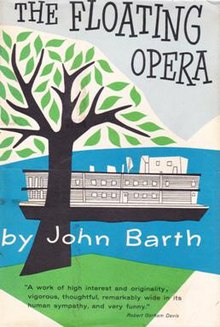John Barth's The Floating Opera is about the day that the narrator, Todd Andrews, decides not to kill himself. That intriguing detail is laid out at the very beginning of the text, and then returned to after a number of long, digressive interludes about Todd's life. We learn that his father committed suicide, and that he long had an affair with the wife of his friend, the pickle magnate Harrison Mack. We learn about a long legal case he adjudicated that involved, among other things, the proper possession of hundreds of jars of human urine. But the question laid out at the beginning of the novel--why did Todd consider killing himself, and why did he change his mind--hangs over the shaggy, humorous narrative:
So. Todd Andrews is my name. You can spell it with one or two d's; I get letters addressed either way. I fear you'd say, "Tod is German for death: perhaps the name is symbolic." I myself use two d's, partly in order to avoid that symbolism. But you see, I ended by not warning you at all, and that is because it just occurred to me that the double-d Todd is symbolic, too, and accurately so. Tod is death, and this book hasn't much to do with death; Todd is almost Tod--that is, almost death--and this book, if it gets written, has very much to do with almost-death.
The central image of the novel is the Floating Opera, a Vaudeville-esque show that takes place off shore in the town where Todd lives. (Weird aside: this is the second novel I've read this year that takes place on Maryland's eastern shore.) The Opera is central to Todd's existential pondering: he decides that suicide is the logical extension of the absurdity of life:
III. There is, therefore, no ultimate "reason" for valuing anything.
Now I added including life, and at once the next proposition was clear:
IV. Living is action. There's no final reason for action.
V. There's no final reason for living.
But--and here goes the spoiler alert--what the reader has not realized is that when Todd decides to kill himself, he decides to sabotage the ventilation system of the Floating Opera and blow up hundreds of people along with him, including his friends, and a girl who his possibly his own daughter. This decision is so starkly at odds with the light-hearted silliness of the narrative, that it comes as an explosive surprise. Todd's decision to not kill himself, in the end, is linked to the failure of this attempt to blow up the Opera.
The ultimate message of The Floating Opera is this: if life is meaningless, you might as well live it as do anything else. As a moral statement, it's not quite profound, but it matches the absurd and digressive nature of the novel, which is clearly modeled on the proto-modernist excess of Tristram Shandy. Everyone lives on, but at the dark center of the novel is the awareness that it might have been otherwise.


No comments:
Post a Comment